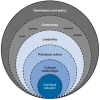Initiatives for promoting educator wellbeing: a Delphi study
- PMID: 38649952
- PMCID: PMC11036615
- DOI: 10.1186/s40359-024-01724-7
Initiatives for promoting educator wellbeing: a Delphi study
Abstract
Background: Growing demands on educators have resulted in increased levels of burnout and stress and decreasing wellbeing. This study aimed to establish expert consensus on the key characteristics required in prospective educator wellbeing initiatives.
Methods: The Delphi approach is a process of forecasting that is based on the aggregated opinion of panel members (or experts) within a field of study. Using a Delphi approach, academic and practitioner expertise were sought over a two-rounds, with 17 and 14 participants in each round respectively. The study aimed to identify how systemic factors (e.g., leadership) could be utilised to promote educator wellbeing. The study also sought expert consensus on enablers and barriers for engagement in educator wellbeing initiatives.
Results: Findings highlighted the importance of fostering positive relationships with colleagues, communities and families, and the active role of wellbeing teams to promote wellbeing initiatives. The need for leaders to address their own wellbeing and build trust within teams was also identified. Panel members identified the need for prospective funding to prioritise wellbeing initiatives. There was also a preference for ongoing initiatives rather than stand-alone wellbeing events that conveyed the ongoing importance of managing one's wellbeing.
Conclusions: This paper presents practical recommendations that can be used to inform the development and evaluation of future initiatives and policy. Applying the consensus derived from this study is likely to make wellbeing initiatives more viable and facilitate uptake amongst educators.
Keywords: Collegial relationships; Educator wellbeing; wellbeing initiatives; Delphi technique; Intervention design; Leadership.
© 2024. The Author(s).
Conflict of interest statement
The authors declare no competing interests.
Figures
References
-
- Cumming T. Early childhood educators’ well-being: an updated review of the literature. Early Childhood Educ J. 2016;45(5):583–93. doi: 10.1007/s10643-016-0818-6. - DOI
-
- Briner R, Dewberry C. Staff wellbeing is key to school success. London (UK): University of London and Worklife support; 2007. p. 4.
-
- Berger E, Reupert A, Campbell TCH, Morris Z, Hammer M, Diamond Z, et al. A systematic review of evidence-based Wellbeing Initiatives for School teachers and early childhood educators. Ed Psyc Rev. 2022;34:2919–69.
-
- Reupert A. Mental health and academic learning in schools: Approaches for facilitating the wellbeing of children and young people. London: Routledge; 2020 [cited 2022 Sept 3]. 10.4324/9781315310930.
MeSH terms
LinkOut - more resources
Full Text Sources


